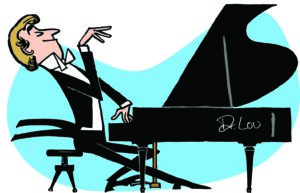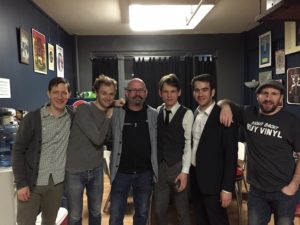Piano Posture Causing Low Back Pain?
If you play piano and your back hurts, there are reasons and solutions that are important to your future.

Back Pain and Piano. Call Dr. Lou, Chiropractor to musicians. (207) 774-6251. Telemedicine available.
You’ve learned to sit up straight on a flat wooden bench. You have put in hundreds to thousands, to tens of thousands of hours of focused practice. Your back hurts during or after practice or performance and it’s starting to affect your ability to wash dishes, play with your kids, even sleep.
At some point you have to think about your viability as a musician down the road. That’s why this blog exists for you.
When you sit up straight on any surface, with extension in your low back and shoulders, you are compressing the joints of the low and mid back, increasing muscular tension in your low back. This combination is one of the leading causes of low back pain, temporary disability, and real trouble if you want to continue to play. As joints of the spine continue to be “loaded” with stress and compression, arthritis and pain are the predictable outcome.
We Were Not Designed To Sit All Day.
In non musicians, low back pain remains the leading cause of disability in persons younger than 45 years old and comprises approximately 40% of all compensation claims in the United States (source: https://www.ncbi.nlm.nih.gov/pmc/articles/PMC2200681/) . Pianists, like programmers and others who sit all day, are more prone to low back pain. We were not designed to sit all day. But even desk jockeys have nice chairs. The flat wood bench is worse.
Low back pain is often a complicated equation of nerves, muscles, and joints. It may not be your hours of practice at the piano, but could just as likely be your day job if it’s not music. You see, there are hundreds of possible causes, irritants, perpetuating factors contributing to your pain, it’s creation, and persistence. If you are not looking at all the possible contributors, you may never find the “natural’ answer to your problems that corrects the cause. Pain is always the result of dysfunction. You can medicate the pain away, but if you want a solution, you have to address the cause(s).
Hope Dealer
Rather than worrying about your future, your career, your hopes and aspirations in music, focus on a fix. Many of the solutions are things you can do at home and while you continue to play. Something as simple as practicing with a different stool or bench, then performing on a traditional bench, may change everything. Decompression exercises for the low back may be the home care that tips dysfunction in the right direction enough so that the cause of your pain goes away. One of the reasons that drugs are prescribed for low back pain is because it’s quick and easy. To understand back pain, you have to dig through layers of history, injuries, lifestyle, sleep patterns, stress of all kinds, diet, hobbies, musical history and music life. It takes time and effort and is often complicated, it’s too much work for the undedicated doctor. It’s easier to give you ibuprofen and a muscle relaxant.
Rock This!
And this….
Try this Too!
After an assessment of your life, posture, playing habits and strategies, health history, and a host of other factors, a specialist in back pain and musicians health should be able to provide you with an executable plan to help yourself get over the pain and impaired function and performance.
Dr. Lou Jacobs is a chiropractor – acupuncturist in Portland, Maine who has been specializing in musician injuries and crew injuries for 20 years. Dr. Lou is available for telemedicine consultations for music-related injuries and health problems. Among those he has permission to mention, Dr. Lou has worked with Mumford & Sons, The Pixies, Steve Vai, Tommy Emmanuel, Ziggy Marley and the Melody Makers, Blackberry Smoke, Gogol Bordello, Trey Anastasio, and Edward Sharpe and the Magnetic Zeros. PHOTOS
Why Dr. Lou?
With “Telechiro” visits, you will not be receiving ongoing in person care. Instead, you will be executing your strategic home treatment plan with the advice and supervision of a seasoned expert in musicians health. You save time, money and travel. You are in control. You are in charge and independent. You will learn techniques that you can use at home, on the road, or in the green room. The skills you learn will benefit you when doing “damage control” for pain, the skills will also work preventively and will help you improve performance. From anywhere in the world, you can dial in to Dr. Lou and his virtual office. Should you need active care, Dr. Lou will find you someone local whenever possible to help you along your journey of healing and performing.

Dr. Lou with Chris Thile and The Punch Brothers. Telemedicine consultations world wide. Dr. Lou puts you in control of your healing. Call (207) 774-6251
